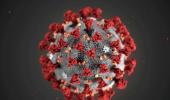Sun light, heat and humidity can create conditions that are less favourable for the spread of coronavirus, a public health official of the Trump administration has said.

The results of a just concluded scientific study conducted by the Science and Technology Directorate of the US Department of Homeland Security, announced during a White House news conference on coronavirus, could be good news for India in its fight against COVID-19.
"Coronavirus dies at a much more rapid pace when exposed to sunlight and humidity. The virus dies the quickest in direct sunlight. Isopropyl alcohol will kill the virus in 30 seconds," Bill Bryan, the Under Secretary of Homeland Security for Science and Technology told White House reporters in the presence of President Donald Trump.
"Our most striking observation to date is the powerful affect that solar light appears to have on killing the virus both surfaces and in the air. We have seen in a similar effect with both temperature and humidity as well where increasing the temperature and humidity or both is generally less favourable to the virus," Bryan said.
The deadly coronavirus which has so far killed more than 188,000 people globally and infected 2.6 million, "is dying at a much more rapid pace just from exposure to higher temperatures and just from exposure to humidity," he said referring to the study.
"We know that summer-like conditions are going to create an environment where the transmission can be decreased. And that's an opportunity for us to get ahead," Bryan said.
Sunlight, high temperature of more than 95 degrees Fahrenheit (or 35 degrees Celsius), and humidity cuts the half-life of the virus on surfaces from up to 18 hours to a matter of minutes, the study said.
According to the US Weather Channel the maximum temperature in New Delhi on Friday is expected to be 98 degrees Fahrenheit.
When the virus is exposed to sunlight, in addition to temperatures above 75 degrees with a humidity of about 80 degrees, it can die in minutes, Bryan said.
However, he clarified that he was not suggesting or making any recommendations on the social mitigation guidelines which includes social distancing.
"Mr. President while there are many unknown links in the COVID-19 transmission chain we believe these trends can support practical decision-making to lower the risk associated with the virus," Bryan told the president.
This, he said has a number of some practical applications.
"For example increasing the temperature and humidity of potentially contaminated indoor spaces appears to reduce the stability of the virus and extra care may be warranted for dry environments that do not have exposure to solar light," he added.
Bryan said his department is also testing disinfectants, readily available.
"We have tested bleach, we have tested isopropyl alcohol on the virus specifically in saliva or respiratory fluids," he said.
"Bleach will kill the virus in five minutes, isopropyl alcohol will kill the virus in 30 seconds and that is with no manipulation no rubbing, just spring it on and leaving it go. You rub it and it goes away even faster."
"We are also looking at other disinfectants specifically looking at the COVID-19 virus in saliva," he added.
The study, he said has identified some of the weak links in the chain that the transmission of the virus depends upon.
"We identified that heat and humidity is a weakness in that chain. We've identified that sunlight, solar light, UV rays is a weakness in the chain," he said.










